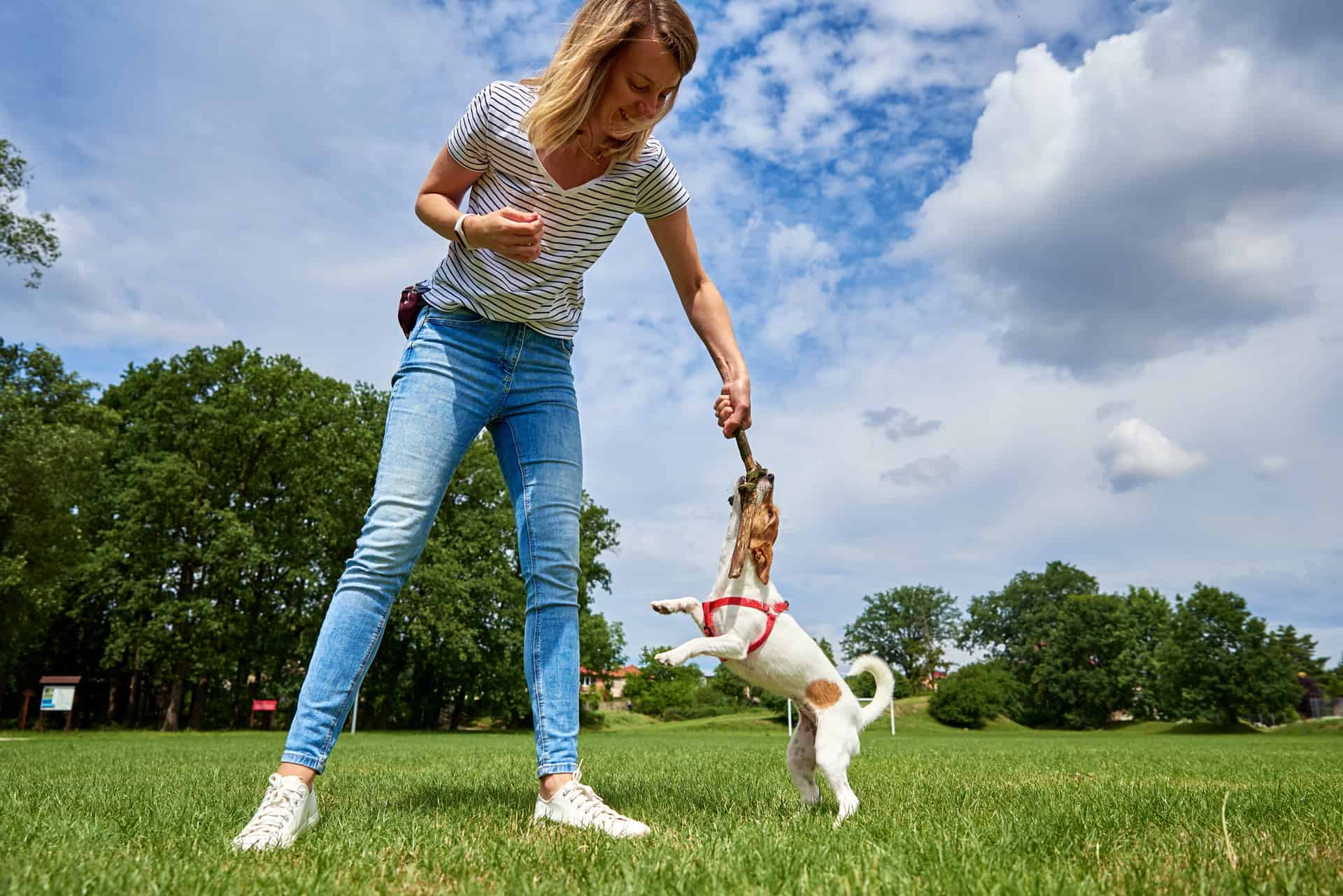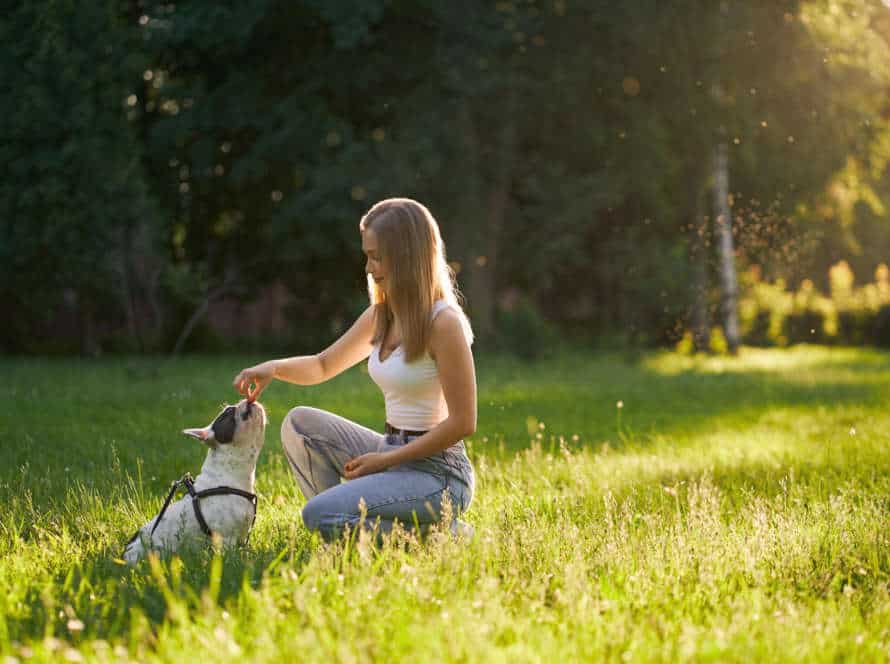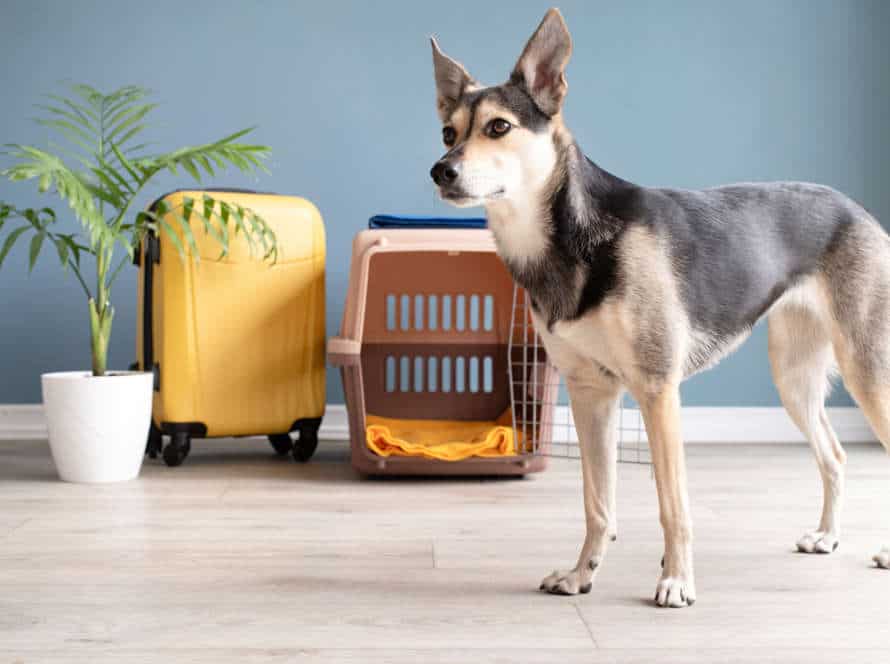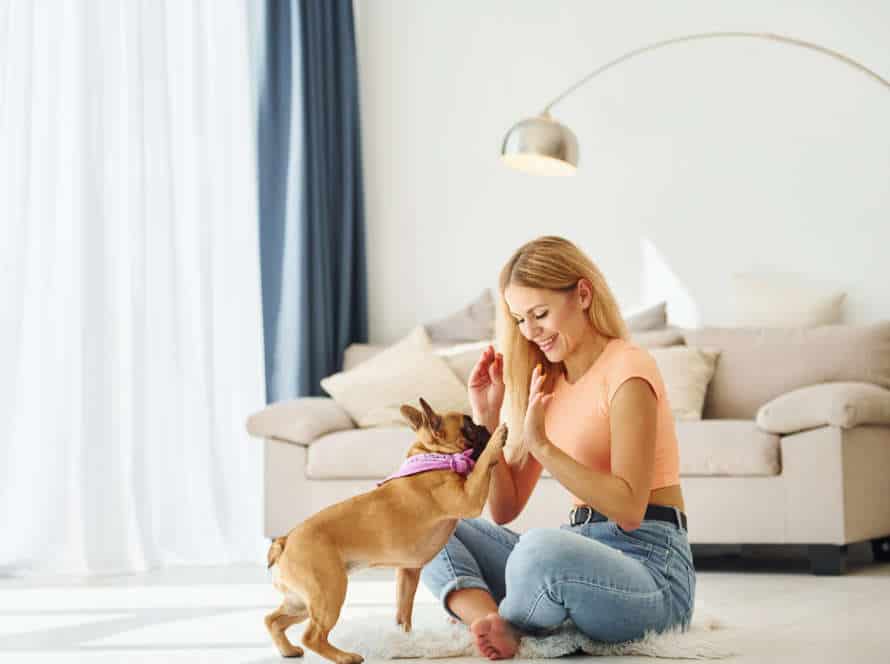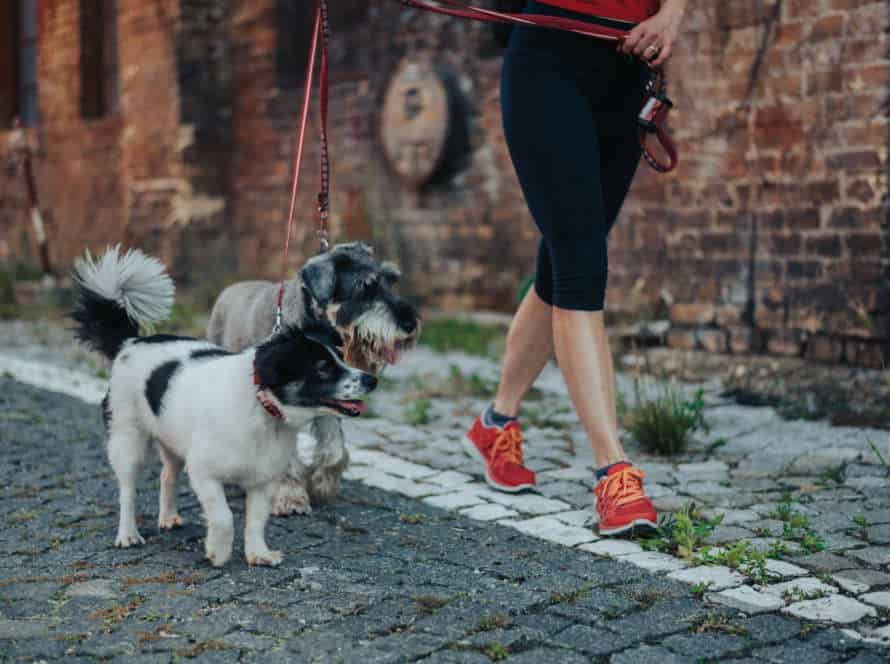How to Address Puppy Biting in a Multi-Dog Household
Puppy biting is a common problem in multi-dog households. It can cause injury, aggression and other issues. Here are tips to address this behavior:
- Teach your puppy bite inhibition. Yell loudly when they bite too hard, then walk away.
- Separate your puppy from the other dogs. This prevents them from constantly bothering each other.
- Provide exercise and playtime. This helps your puppy release energy and learn socialization skills.
- Consult a professional trainer. If puppy biting continues, seek help from a professional.
Patience, consistency and positive reinforcement are all needed to address puppy biting. With proper training, your puppy can learn how to behave around other dogs.
Identifying the Causes of Puppy Biting
Puppy biting is natural. It helps pups explore and use their jaws. But it can be a problem if it gets aggressive or you have lots of dogs. So, identifying why puppies bite is the 1st step. Here are some common reasons:
- Teething (3-8 months old). They chew to ease teething discomfort.
- Playfulness. They are curious and playful so they play-bite.
- Fear or aggression. If scared, they may bite.
- Lack of training. Some pups don’t know how to stop.
To stop biting, understand why it’s happening. Use positive reinforcement like rewards and redirecting bad behavior. Teach them bite inhibition and other commands.
Pro Tip!
1.1 Teething and Mouthing Behavior
Teething and mouthing are totally normal for pups until about 6 months old. It’s key to address biting in multi-dog houses for the safety and comfort of all doggos. Here are some tips:
- Give each pup their own toys to stop competition and conflict.
- Train your furry friend with commands like “no” and “leave it” to nip biting in the bud.
- Use positive reinforcement like treats and praise to reward good behavior.
- Keep an eye on interaction between your pup and other dogs to intervene if needed.
- Use deterrents like bitter apple spray on furniture and other objects that your pup likes to chew.
With the right training and care, biting can be addressed in a multi-dog household, bringing harmony and happiness to all!
1.2 Lack of Socialization and Training
Biting in puppies, in households with more than one pooch, is often caused by lack of socialization & training. To fix this, do these key steps:
- Schedule regular training sessions with a pro trainer or behaviorist – to understand the cause of the biting & build a plan to address it.
- Socialize your pup with other doggos in a secure & controlled environment – such as puppy playdates, obedience classes, & visits to vaccinated & well-behaved canines in the area.
- Establish rules & boundaries in the multi-dog household – like setting limits on rough play, enforcing consistent training methods, & rewarding good behavior.
1.3 Fear and Anxiety
Fear and anxiety can be the cause of puppy biting in multi-dog homes. Address these issues to reduce biting and create harmony. Here are tips to help:
- Create a safe space where your pup can go when overwhelmed or scared.
- Train and socialize your puppy to build confidence and reduce anxiety.
- Use treats and praise to encourage good behavior.
- Get professional help from a trainer or behaviorist.
Remember, puppy biting is normal and can be managed with patience, consistency, and training techniques.
Understanding the Dynamics of Multi-Dog Households
Multi-dog households need special management. To prevent and address puppy biting, you must understand the complex dynamics between your dogs. The pecking order can change over time. When introducing a new pup, there could be a power struggle.
Puppy biting is a natural behavior, but can become aggressive if not addressed. Here’s how to handle it:
- Observe and interrupt any aggressive behavior.
- Ensure each pup has their own space and resources.
- Train them together and give them equal attention.
To make sure things are safe, get help from a pro.
2.1 Pack Hierarchy and Dominance
Pack hierarchy and dominance are very important when it comes to stopping puppy biting in a multi-dog home. Dogs are pack animals, they naturally form a structure in their group.
To stop puppy biting, you must be the pack leader and teach your dogs their position in the pack. Here are some tips:
- Be reliable with training and daily regime.
- Reward good behavior with positive reinforcement.
- Train your dogs commands like “Sit,” “Stay,” and “Come.”
- Don’t use physical punishment or harsh scolding.
- Separate dogs that act aggressively until they can be trained.
- Give each dog its own bowl and toys to keep away competition and fighting.
Once you’re the pack leader and train your dogs obedience, you can help stop puppy biting and create a peaceful multi-dog household.
2.2 Resource Guarding and Jealousy
Resource guarding and jealousy can cause puppy biting in multi-dog homes. Here are tips to help:
- Teach “sit,” “stay,” and “come” commands.
- Feed puppies meals in different rooms to avoid food issues.
- Give toys and treats in a controlled environment.
- Supervise during playtime.
- Don’t show favoritism. Give equal attention, toys, and treats.
- If puppies still bite or situation gets worse, seek help from a pro.
Patience, consistency, and proper training can help puppies coexist peacefully.
2.3 Play Behaviors and Roughhousing
When it comes to pup biting in a home with multiple dogs, it’s important to understand play and roughhousing. Here are some points to remember:
- Pups use their mouth to investigate and play.
- Pups learn how to bite right through playing with other pups and dogs.
- Monitoring pup and adult dog play can help the pup figure out acceptable behaviors.
- Intervene if the play gets too intense or if one of the dogs looks uncomfortable or scared.
- Be consistent and use positive reinforcement to teach pup proper behavior around other dogs.
- If you’re unsure or having trouble, seek help from a professional.
Strategies for Preventing Puppy Biting in a Multi-Dog Household
Puppy biting is a common – and often frustrating – problem in multi-dog households. But, with the right strategies, you can avert it. Here are five tips to help:
- Teach bite inhibition – encourage your pup to chew on chew toys and redirect biting away from other dogs.
- Always supervise playtime – to stop aggressive behavior and interrupt any signs of biting.
- Practice positive reinforcement – reward good behavior and training to foster peaceful, non-biting interactions.
- Train your puppy separately – give your pup individual training sessions, to stop competition and aggression between dogs.
- Seek professional help – consult with a pro dog trainer or behaviorist, to tackle persistent biting and create a tailored plan for your multi-dog household.
By following these steps, you can prevent puppy biting and create a peaceful home for your furry friends.
3.1 Supervision and Management
Supervision and management are paramount for tackling puppy biting in multi-dog households. Here are a few tips to help you supervise and manage your puppies to prevent biting and create a safe and happy environment for all your canine pals:
- Give each pup their own space and personal items, e.g. food bowls, toys, and sleeping areas.
- Never leave your pups unsupervised, particularly at mealtimes, playtime, and rest time.
- Utilize baby gates, crates, or playpens to separate your puppies when you can’t monitor them.
- Teach your puppies basic commands such as “leave it,” “drop it,” and “stay” to divert their biting behavior.
- Reward good behavior and use positive reinforcement techniques to put an end to biting.
- Get professional advice and training if your puppies’ biting behavior still persists or gets aggressive.
Pro tip: To help your puppies build up good behavior habits and prevent biting, be consistent and patient with your training and supervision.
3.2 Training and Socialization Exercises
It’s key to do training & socialization exercises to curb puppy biting in a multi-dog home. Here are some tips:
- Make sure each pup gets enough play and exercise, to avoid boredom & frustration.
- Teach “leave it” and “drop it” commands to your puppy and other dogs, to discourage biting.
- Use positive reinforcement to reward good behavior and stop bad behavior.
- Train your puppy to respect personal space – create a space for them to play & sleep.
- Think about hiring a professional – like a dog trainer or behaviorist – to assess your puppy’s behavior and come up with a custom plan.
These steps can help you address and prevent puppy biting, making a safe & peaceful environment for your pets and family.
3.3 Providing Sufficient Mental and Physical Stimulation
Tackle puppy biting in multi-dog households by providing adequate mental and physical stimulation. Here’s how:
- Exercise and play with your pup throughout the day to let out energy and avoid biting as a form of fun. Give interactive toys and puzzles for mental stimulation.
- Teach your pup to settle down on a mat or bed for quiet times. Reward them for being calm and extend the duration over time.
- Socialize your pup with other dogs to learn proper play and reduce rough or aggressive behavior.
- Keep your pup mentally engaged with obedience and trick training.
- Join a pup training class to learn good behavior and socialization skills.
How to React When Puppy Bites
Puppy biting can be a problem in a multi-dog home. So, it’s best to address it quickly. Here are 3 ways to react when your pup bites:
- Make a loud sound. Yell or clap to startle the pup. This should stop it from biting.
- Redirect the biting. Give your puppy something else to chew on, like a toy or a bone.
- Consistency. Everyone in the home should use the same technique.
With patience and training, your puppy will learn that biting is not okay. This will create a safe and comfy home for everyone!
4.1 Interrupting the Bite
When tackling puppy biting in a multi-dog home, interrupting the bite is one of the best methods to teach your pup not to nip or bite other dogs. Here’s how:
- Keep a close watch for signs of biting, like growling, snapping, or lunging.
- When you see these behaviors, step in with a firm and loud “No” or “Ah-ah”.
- Move your pup away and redirect their focus to a toy or treat.
- Praise them when they react positively to the redirection.
Consistency is vital; use the same reaction each time your pup starts biting. Over time, they’ll learn to interact and play nicely with other dogs in your house.
4.2 Providing Appropriate Consequences
Dealing with puppy biting in a multi-dog home? Need to give it the right consequence! Here are a few tips:
- Startle the pup with a clap or loud noise when it starts biting.
- Reward and praise the pup when it behaves well.
- Put the pup in a separate room or crate for a few minutes when it bites.
- Use lemon juice, tea tree oil and other natural ingredients as a repellent for furniture and objects that the pup targets for biting.
Consistency is the key here. Give appropriate consequences and rewards after each incident and with time, your pup will learn how to control the urge to bite and become a beloved part of your multi-dog home.
4.3 Avoiding Physical Punishment
Physical punishment is not good for puppy biting, especially in a multi-dog home. It can even make behavior worse and create long-term training issues. Here are some alternative, positive methods:
- Give each dog their own toys and treats to avoid jealousy.
- Teach “sit,” “stay,” and “come” to help the pup control themselves.
- Use rewards like treats and praise for good behavior.
- Spray things your puppy likes to bite with a deterrent.
- Discourage rough play and biting by redirecting attention to a toy or a special play zone.
Remember, patience and consistency are key. Plus, consulting a professional dog trainer can be helpful.
Addressing Puppy Biting with Adult Dogs
Tackling puppy biting in a multi-dog home needs patience and consistency. Plus, a combination of training techniques for the safety and well-being of all. Here’s how:
- Encourage positive interactions between them. Supervise playtime and separate when needed.
- Train pup with positive reinforcement. Offer chew toys to keep them occupied.
- Be consistent with training and corrections. Establish boundaries and stop biting in the long term.
- If needed, get a skilled dog trainer for complex issues.
Patience and effort are key. With these, you can have a peaceful and secure home for all your furry pals.
5.1 Introducing Adult Dogs to Puppies
Introducing adult dogs to puppies can be a challenge. Especially if one or more of the dogs show aggression when the puppy bites. Here are the steps to do it right:
- Short visits supervised: Let the adults and pup interact for short times, and watch them closely.
- Spread out the meetings: Gradually increase the length and frequency of their meetings. Make sure each one is positive, and the adults stay relaxed.
- Train pup to bite less: Train the pup to control its biting, by distracting it with a toy or treat. Reward it for good behavior.
- Calm behavior: Give the dogs plenty of exercise, toys, and training to help them stay calm.
- Get help if needed: If the adult dog is aggressive, contact a professional dog trainer.
Pro tip: Consistent, positive reinforcement is key for introducing adult dogs and puppies in a multi-dog home.
5.2 Managing the Interaction Between Adult Dogs and Puppies
Controlling the relationship between adult canines and puppies is essential for reducing puppy biting in a house with multiple dogs. Here are a few steps you can take:
- Establish limits: Introduce the pup to the grown-up dogs gradually and watch their interactions closely. Strengthen limits to discourage hostile behavior.
- Teach your pup: Train your pup to obey orders like “sit,” “stay,” and “leave it.” This will help you manage your pup’s actions and prevent biting.
- Distract them: If your pup starts to bite, divert their attention with a toy or treat. This will help focus their energy away from biting.
- Supervise play: Monitor playtime between your pup and the adult dogs. Separate them if play gets too intense.
- Seek help: If your pup’s biting persists, seek professional help from a dog trainer or behaviorist to address the issue.
5.3 Using Positive Reinforcement to Stop Dog Aggression
Positive reinforcement is a great way to deal with dog aggression in a multi-dog household. Especially when it comes to puppy biting.
Here are the steps:
- Use a high-pitched voice when the pup is biting to show that it hurts.
- If they stop, praise them and give a treat.
- If they keep going, remove yourself from the situation. This teaches your pup that biting means the fun stops.
- Reward good behavior between the puppy and other dogs in the household.
- Provide toys and playtime so your pup can chew and bite.
- Use positive reinforcement consistently to teach acceptable behavior and reduce aggression.
Other Solutions to Address Puppy Biting in a Multi-Dog Household
Puppy biting can be a common issue in multi-dog households. There are solutions to address this behavior.
Encouraging playtime and providing toys for the puppy can help to redirect energy and prevent biting.
Training and positive reinforcement can help teach the pup the correct behavior and stop biting.
If the puppy continues biting, a time-out in a different area of the house can help relax them and show that biting is not okay.
It’s key to keep in mind that puppy biting is natural. Patience and consistency are important to correct it in multi-dog households.
6.1 Seeking Professional Help
Struggling to address puppy biting in a multi-dog household? Seeking professional help is an awesome option. A professional dog trainer or behaviorist can give you personal advice and help you create a training plan.
During the consultation, the professional will watch your dogs to see what’s going on. They may also ask questions about your dogs’ history and daily routine.
The pro will give you a detailed training plan. This may include exercises to reduce biting, obedience training, and tips for managing interactions between your dogs.
Seeking professional help is a good move. It’s a proactive step to make sure your furry friends are safe and healthy.
6.2 Using Muzzles and Bite Inhibitors
Muzzles and bite inhibitors are a useful technique to stop puppy biting in a multi-dog household.
Introduce the muzzle by letting your pup sniff it and reward them with treats. Put it on for short periods of time and make sure it’s comfortable and well-fitting.
Bite inhibitors can be fastened to the pup’s collar and muzzle to reduce the force of the bite and avoid injury.
Train your pup by rewarding gentle playing and biting and withdrawing playtime when they become too rough. Muzzles and bite inhibitors can help, but consistent training and positive reinforcement should be your main focus.
6.3 Rehoming One of the Dogs if Necessary
Rehoming a pup should be a final resort when dealing with puppy biting in a multi-dog home. There are steps to take before you decide to split with your furry pal.
Here are some strategies to attempt to reduce puppy biting:
- Separate the pup from other dogs and people when he is biting.
- Use positive reinforcement. Praise him when he is gentle and give treats when he follows proper behavior.
- Redirect the biting. Whenever he starts, replace the negative action with a positive one by giving him a chew toy.
- Get professional help. Consult with a pro dog trainer or behaviorist to understand reasons for the behavior and use effective methods to address it.
Rehoming should only be done if all other methods fail and you have made sure your puppy is going to a safer and better home environment.
Frequently Asked Questions
Q: Why do puppies bite?
A: Puppies explore their environment through their mouths, and biting is a natural part of their play and socialization. However, excessive biting can be a sign of anxiety or stress.
Q: Can puppy biting be dangerous?
A: Yes, depending on the severity of the bite and the size of the dog. Puppies have sharp teeth and can unintentionally hurt humans and other animals.
Q: How can I address puppy biting in a multi-dog household?
A: Start by providing enough mental and physical stimulation for your puppies. Encourage positive play and reward good behavior. Consistency and communication between all members of the household are also essential.
Q: Should I separate my puppies when they start biting?
A: If the biting becomes excessive or aggressive, separating and providing a time-out may be necessary. However, be sure to introduce them to each other again later and supervise their interactions closely.
Q: Are there any training techniques to prevent puppy biting?
A: Yes, techniques such as positive reinforcement, redirecting attention, and providing appropriate chew toys can help prevent and redirect puppy biting behavior. Consult with a professional dog trainer if needed.
Q: How long does it take for puppy biting behavior to disappear?
A: Puppy biting behavior can continue for several months as they are teething and learning appropriate social behavior. Consistent training and positive reinforcement can help reduce and eventually eliminate this behavior.

